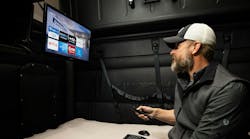"Start dreaming about driverless trucks on a super-smart highway."
When people talk about the future of the trucking industry around Eaton, the conversation has a tendency to increase its pace - to be pitched a couple of notes higher than ordinary conversation. The subject is stimulating to all of us, because without worrying about all the hard work required to get us to the future of trucking, we can dream about its outcomes and benefits to all of us.
Some of our best and brightest individuals at Eaton are tasked with "future visioning" based on the market trends and customer values we've identified, studied, and confirmed. In fact, there is an ongoing effort at Eaton, called Truck 2000, to give us an idea of what we should be pursuing to meet the industry's needs in the 21st century.
Our vision extends beyond today's definition of a diesel engine and geared powertrain. Diesels are falsely maligned - they are a highly efficient energy generator, particularly when integrated with an automated powertrain designed to complement the performance characteristics of the diesel cycle.
The CVT (continuously variable transmission) is finding its way into small cars, but we don't see the CVT, at least as we know it today, being adapted to a heavy-duty truck powertrain. Today, there is significant effort in the area of Hybrid Electric Drives in automobiles. We believe HEV technology has the potential to help diesels perform radically better in emission-sensitive zones. In fact, the diesel/electric combination can provide the same efficiencies as a CVT, by keeping the diesel engine speed constant for optimum efficiency and low emissions.
Electronically assisted and automated components hold the promise to solve their own problems before the truck operator or shop technician even knows there was anything wrong.
Driver monitoring and control will become more than a random drug test over the next several years as well. The driver fitness system in the cab of the truck will gauge his or her ability to drive, and prohibit the truck from starting until he or she meets the physiological guidelines.
There is no greater opportunity for significant gains in efficiency and productivity than with improved asset utilization in our industry. Today, our industry is employing GPS location, truck-to-fleet communications, and management software systems. Now, fast-forward 10 or 15 years, and consider the total integration of these information systems for trucks, highways, traffic, management, and maintenance systems. It's self-learning ... self-managing ... self-diagnosing ... and self-correcting.
We've reduced the uncertainty and variables to acceptable levels - except for the human element of the equation. So, if you want to think way outside of the box, start dreaming about driverless trucks on a super-smart highway. Cargo travels for 1,200 miles without driver intervention - and is delivered the last 12 miles with human assistance.
The trucking industry on a global basis is being forced into a 21st-century pace, with many of us still utilizing a 20th-century business model. We are shackled by conventional thought processes and business processes that were just fine for the last 10 or 20 years. Tomorrow, the old rules don't apply. And if we continue to try to make them fit, someone's going to sneak up behind us and pick our pockets.
We must all be sure that our strategic plans, no matter what we do for the industry, reflect a thinking that is derived from tomorrow's forecasts - not yesterday's history.


